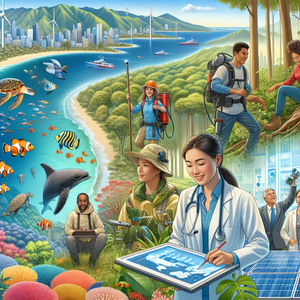
15 Inspiring Career Paths in Environmental Science: A Guide for Those Seeking Change
As more individuals look for careers that offer personal fulfillment while making a positive impact on the world, environmental science has emerged as a compelling option. Growing concerns about climate change, biodiversity loss, and the demand for sustainable practices have led many professionals to transition into this vital field. This guide explores 15 significant career opportunities within environmental science, emphasizing how to leverage your existing skills while gaining the specialized knowledge necessary to address today’s environmental challenges. By outlining practical steps for those considering a career change, including educational pathways and real-life success stories, this article serves as a valuable resource for aspiring environmentalists.
Job Summaries:
Environmental Scientist:
- Environmental scientists conduct research and analyses to address urgent environmental issues.
- They gather and interpret data regarding air, water, and soil quality to guide conservation efforts and inform public policy.
- A bachelor's degree in environmental science or a related discipline is typically required, alongside strong analytical skills.
- With an expected job growth rate of 8% through 2029, this role presents promising prospects for career changers.
Conservation Biologist:
- Focusing on the preservation of biodiversity.
- Conservation biologists perform field studies.
- They collaborate with governmental organizations to formulate conservation strategies.
- A background in biology, ecology, or environmental science is essential.
- Fieldwork experience is necessary.
- The increasing focus on wildlife preservation highlights the demand for this vital role.
Environmental Engineer:
- Environmental engineers create systems to reduce pollution and manage waste effectively.
- They generally require a degree in environmental or civil engineering and a solid understanding of sustainable practices.
- This profession is crucial as industries adapt to stricter environmental regulations and improve their sustainability efforts.
Sustainability Consultant:
- These professionals help organizations integrate sustainable practices into their operations by analyzing processes and suggesting improvements.
- A background in environmental science or business, paired with strong communication skills, is advantageous.
- The rising trend of corporate responsibility enhances the demand for sustainability consultants.
Environmental Policy Analyst:
- Environmental policy analysts assess and advocate for policies that impact environmental health.
- A degree in public policy or environmental science is essential, along with strong analytical abilities.
- This position plays a pivotal role in shaping effective environmental legislation, making it ideal for those interested in advocacy.
Wildlife Biologist:
- Wildlife biologists study animal populations and their habitats.
- They contribute significantly to conservation efforts.
- Typically, they hold a degree in wildlife biology or a related field.
- Field research experience is particularly beneficial.
- The need for wildlife biologists continues to grow as habitat destruction escalates.
Environmental Educator:
- Environmental educators promote awareness about sustainability through workshops and educational programs.
- A background in education or environmental science is helpful.
- This role is especially rewarding for those passionate about teaching and community involvement.
Urban Planner:
- Urban planners create land-use strategies that foster sustainable communities.
- A degree in urban planning or environmental science is typically required.
- This position is crucial for developing cities that minimize environmental impact, particularly in light of rapid urbanization.
Marine Biologist:
- Marine biologists investigate ocean ecosystems and advocate for marine conservation.
- A degree in marine biology is necessary, along with field research experience.
- The urgency of protecting marine environments underscores the significance of this role.
Environmental Health and Safety Specialist:
- These specialists ensure that workplaces comply with environmental regulations and health standards.
- A degree in environmental science or safety management is generally required.
- This role is essential for protecting public health and the environment.
Climate Change Analyst:
- Climate change analysts study the effects of climate change on ecosystems and human systems.
- A strong analytical background in environmental science or meteorology is crucial.
- As climate change remains a pressing global issue, this role is increasingly relevant.
Geographic Information Systems (GIS) Specialist:
- GIS specialists use spatial data to analyze environmental challenges.
- Creating maps and models to aid decision-making.
- A degree in geography or environmental science is usually necessary.
- The application of GIS technology is rapidly growing in environmental management.
Environmental Technician:
- Working alongside scientists, environmental technicians assist with sample collection and analysis.
- A degree in environmental technology is often required.
- This role is foundational in environmental monitoring and compliance.
Natural Resource Manager:
- Natural resource managers oversee the sustainable use of resources such as forests and water.
- A degree in natural resource management is essential, as are strong leadership skills.
- This role is vital for maintaining ecological balance amidst increasing resource demands.
Environmental Data Analyst:
- Environmental data analysts gather and interpret data to evaluate environmental conditions.
- Typically, a degree in environmental science or data science is necessary.
- This role is crucial for informed decision-making in environmental policy and management.
The field of environmental science offers a wealth of diverse opportunities for individuals looking to make a significant career shift. By understanding the various roles and their requirements, aspiring professionals can navigate their transition into this impactful domain more effectively. As the demand for sustainable practices and environmental protection continues to rise, so too do the opportunities to contribute to a healthier planet. Exploring current job openings, connecting with industry professionals, and seeking out additional resources can provide valuable insights and pave the way for a successful career in environmental science. With dedication and the right resources, anyone can embark on this fulfilling journey.
Explore More Jobs

